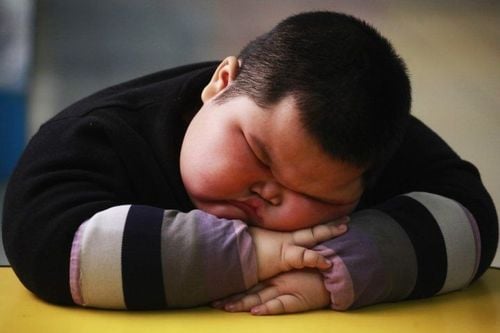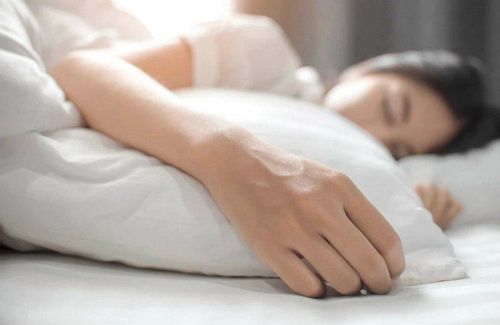This is an automatically translated article.
The truth is sleep can affect your weight. Because when you lack sleep, you are more likely to drink a large coffee with milk to stay awake. You are also more likely to skip exercise because you are too tired, stay up late because you feel uncomfortably full after a late dinner.
1. Research on sleeping a lot has weight loss
We all know that eating right and exercising are important for maintaining a healthy body weight. But many studies have also shown a strong link between not getting enough sleep and being overweight.
On average, people with less sleep weigh more and tend to gain weight over time. For example, middle-aged people who sleep less than 7 hours a night are heavier and more likely to be obese than people who sleep 7 hours or more. A study of nearly 70,000 women followed for 16 years found that compared with women who slept at least 7 hours a night:
People who slept 5 hours a night 32% more gained at least 15 kg People who slept 6 hours a night more than 12% gained at least 15kg Although the link between sleep and weight is increasingly clear, the exact mechanisms are still being studied. Not getting enough sleep is known to cause changes in hormones like ghrelin (which increases appetite) and leptin (which indicates fullness). As a result, sleepy people tend to feel hungry and expend more energy than well-rested people. Indeed, studies show that when people are sleep-deprived, the brain responds differently and makes it harder to refuse unhealthy foods. Insufficient sleep is also known to decrease metabolic rate and affect insulin production.
Unfortunately, these changes also affect young people. Sleep deprivation has been shown to increase the risk of obesity in children. Because childhood obesity rates have tripled in the past 30 years, doctors have begun studying the effects of sleep on weight loss, focusing on the role sleep plays in weight management.

Thiếu ngủ cũng là một trong các nguyên nhân gây béo phì ở trẻ em
2. The brain and sleep
Lack of sleep causes the brain to shut down in the frontal lobe - where decision-making and impulse control are focused, thereby making bad decisions. Just like when you're drunk, you don't have the mental clarity to make the right decisions if you don't get enough sleep.
In addition, when you are too tired, the reward center of the brain is stimulated, forced to look for something to feel better. So, even if you can curb your cravings when you're well-rested, your sleep-deprived brain will have a hard time rejecting sweet treats.
A study in the American Journal of Clinical Nutrition found that when people are sleep deprived, they tend to snack more at night and tend to choose high-carb foods. In another study, sleep-deprived people chose twice as many high-fat snacks as those who got eight hours of sleep.
MORE: Why does sleep loss cause weight gain?
Another study shows that too little sleep causes people to eat more of all types of food, which in turn leads to weight gain. Researchers found that sleep deprivation leads to cravings for foods high in energy and high in carbohydrates.
In sum, a "sleepy brain" will crave more junk food and find it harder to resist delicious food, hindering weight loss efforts.
3. Sleep and Metabolism
Sleep is like nutrition for the brain. Most people need 7 to 9 hours of sleep each night. If you sleep less than that, your body will react in an uncontrollable way, which means it is impossible to resolve to diet. On the other hand, getting too little sleep will trigger a spike in cortisol. This stress hormone signals the body to conserve energy to fuel waking hours.
Researchers found that when dieters cut back on sleep for about 14 days, the amount of weight lost from fat fell by 55%, even though the calories remained the same. They will feel hungrier and less satisfied after a meal, and energy will also be expended.
Furthermore, within just 4 days of not getting enough sleep, the body's ability to process insulin - a hormone needed to convert sugars, starches and other foods into energy - will deteriorate. Specifically, insulin sensitivity will be reduced by more than 30%. When your body doesn't respond well to insulin, your body has trouble processing fat from your blood, so it will be stored as fat.
In short, it's not that much sleep leads to significant weight loss, but too little sleep will hinder your metabolism and contribute to weight gain.

Giấc ngủ đóng vai trò quan trọng với bộ não của con người
4. Tips for a good night's sleep
In today's world, getting enough sleep can face many obstacles, especially when electronic devices - computers, TVs, mobile phones, tablets, attract you to stay up late" more a little bit".
The following are basic and simple tips for getting quality sleep:
Turn off computers, cell phones and TVs at least 1 hour before going to bed; Reserve the bedroom for sleep and "love stories". Think of relaxation and comfort, rather than work or play; Create a routine before going to bed. Don't deal with important issues near bedtime. Instead, take a warm bath, meditate or read a book; Stick to a fixed schedule, getting up and resting at the same time every day, even on weekends; Pay attention to the type of food and when to eat it. Avoid eating large meals and drinking alcohol near bedtime, as this can cause heartburn and difficulty falling asleep. Avoid soda, tea, coffee and chocolate after 2 pm, because caffeine can stay in your body for 5-6 hours and keep you awake; Darkness signals the body to release melatonin, while light blocks this natural sleep hormone. So turn off the lights; In short, sleep and weight have long been linked by scientists. Experts agree that getting enough sleep is just as important to your health, happiness and weight loss efforts as diet and exercise.
Please dial HOTLINE for more information or register for an appointment HERE. Download MyVinmec app to make appointments faster and to manage your bookings easily.
References: webmd.com, sleepfoundation.org, healthline.com













